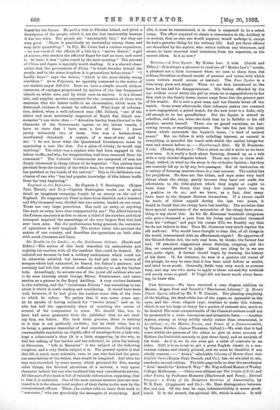Six Months in the Ranks ; or, the Gentleman Private.
(Smith and Elder.)—The author of this book describes his antecedents and explains his motives with all the candour that could be desired. He enlisted not because he had a military enthusiasm which could not be otherwise satisfied, but because he had got into a variety of scrapes which had exhausted, he feared, his father's patience, and certainly had left him without sufficient audacity to ask for farther help. Accordingly, he accosts one of the jovial old soldiers who are to be seen loitering about George Street, Westminster, and takes service as a gunner in the Royal Artillery. A. very curious business is this enlisting, and the " Gentleman Private " has something to say about it which is worth reading and considering. It would have been well, however, if he had given his readers some idea of the time to which he refers. We gather that it was some years ago, as he speaks of having enlisted for "twelve years," and as he also has had the opportunity since of watching the career of several of his companions in arms. We should like, too, to have had some guarantee from the publisher that we are read- ing fact, not fiction. The book looks genuine, there is nothing in it that is not perfectly credible ; but its chief value lies in its being a genuine transcript of real experiences. Declining with commendable resolution an eligible offer of marriage from a lady who kept a tobacconist's shop (it is a little staggering, by the way, to find her talking of her banker and her solicitor), he joins his battery at Sheerness. " Life in Barracks" is the subject of the following chapters, and a very fertile subject it ie. The general upshot is that this life is much more tolerable, even to one who had had the previ- ous associations of the writer, than would be imagined. And then his way was smoothed by some money, which procured for him, among other things, the devoted attentions of a servant, a very queer character indeed, but one who rendered him very considerable service. All this part of the book is full of valuable information, supposing, that is, that it is authentic. One of the most serious matters that are men- tioned in it is the almost total neglect of their duties to the men by the commissioned officers. These, the author tells ns, leave their work to ." non-coma.," who are practically the managers of everything. And this, it must be remembered, is in what is supposed to be a select corps. The effort required to obtain a commission in the Artillery is so serious, that no one, one would suppose, would undergo it, except he had a genuine liking for the military life. And yet these officers are described by the author, who writes without any bitterness, and seems to have received kind treatment from his superiors, as the merest idlers. Is it so now ?
































 Previous page
Previous page